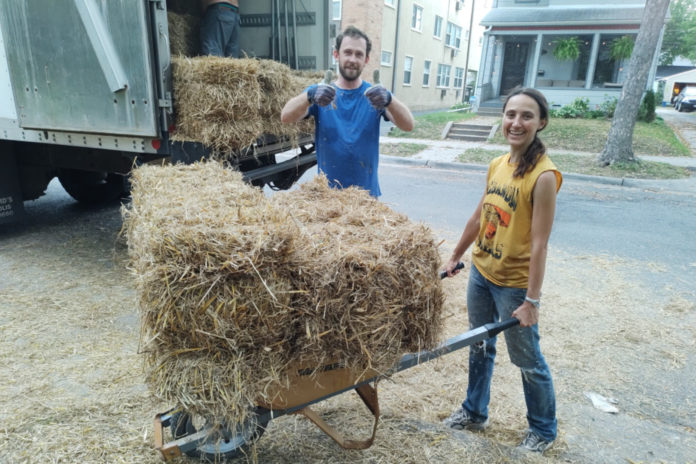Katie Jones is a candidate for Minneapolis City Council in Ward 10 who apparently wants the city to consider the use of straw houses, like the one she is building for herself.
“Creating a climate resilient Minneapolis is going to take piloting many new approaches to infrastructure,” she said on Monday in a tweet. The post contains a link to a video in which she provides a tour of the straw house she’s building to live in with her husband. She also said she looks forward to making “change to the physical and political fabric of this city.”
Jones has clarified on Facebook that she plans to live in the house, that she’s building it for environmental reasons and that “this is the first strawbale home in Minneapolis.”
Despite being labeled and promoted as a straw house, Jones’s new residence is mostly constructed out of conventional building materials — the foundation is concrete and the frame is made from wood. This is typical of straw homes which, despite their name, only use straw sealed with plaster as insulation to avoid using modern, petroleum-based materials.
Straw bale construction is a historically established construction technique, however, and some sources claim that straw homes “can last 100 years at least. However, this is assuming the homeowner keeps the straw properly sealed to avoid pest infestations or mold.
Jones also advocates for a number of other progressive ideas about housing. One of these is the “the Indoor Villages model” mentioned on her website. Her capitalization of the words “Indoor Villages” seems to indicate she’s referring to the Avivo Village, a system of pods constructed inside a warehouse to provide shelter for Minneapolis’s growing homeless population.

Avivo does not require people to remedy their drug abuse problems or quit drinking to occupy a pod.
While pod-style homeless shelters have been in use to curb vagrancy in California cities for years, this style of residency has only recently gained traction in the Midwest. A city in Michigan opened a facility similar to Avivo earlier this month.
Jones also believes Minneapolis should promote “cooperative housing,” a type of housing where residents buy into a building but do not retain any ownership of their individual unit.
Real estate writer Kate Wood explains the process of buying into a co-op:
“When you buy a co-op, you don’t buy the unit itself. You purchase shares that grant you the right to live in the unit. Not only are the common areas and exterior owned by the corporation — the interior of the co-op is, too. This means if you want to do a major renovation, like a kitchen remodel, you may need the co-op board’s approval.”
Finally, Jones believes that these new neighborhoods should not be patrolled by the Minneapolis Police Department. Instead, she thinks traditional cops should be replaced by “humane, effective alternatives to armed policing.”
Question 2 will ask voters if the “Minneapolis City Charter [should] be amended to remove the Police Department and replace it with a Department of Public Safety.” Early voting began Sept. 17, while Election Day is Nov. 2.
















